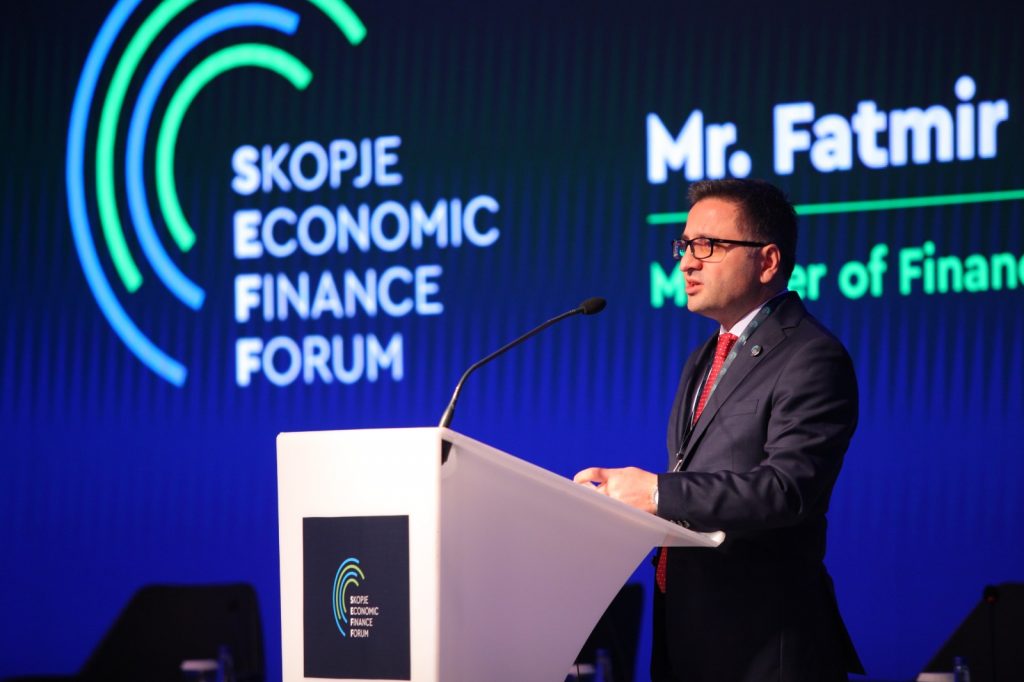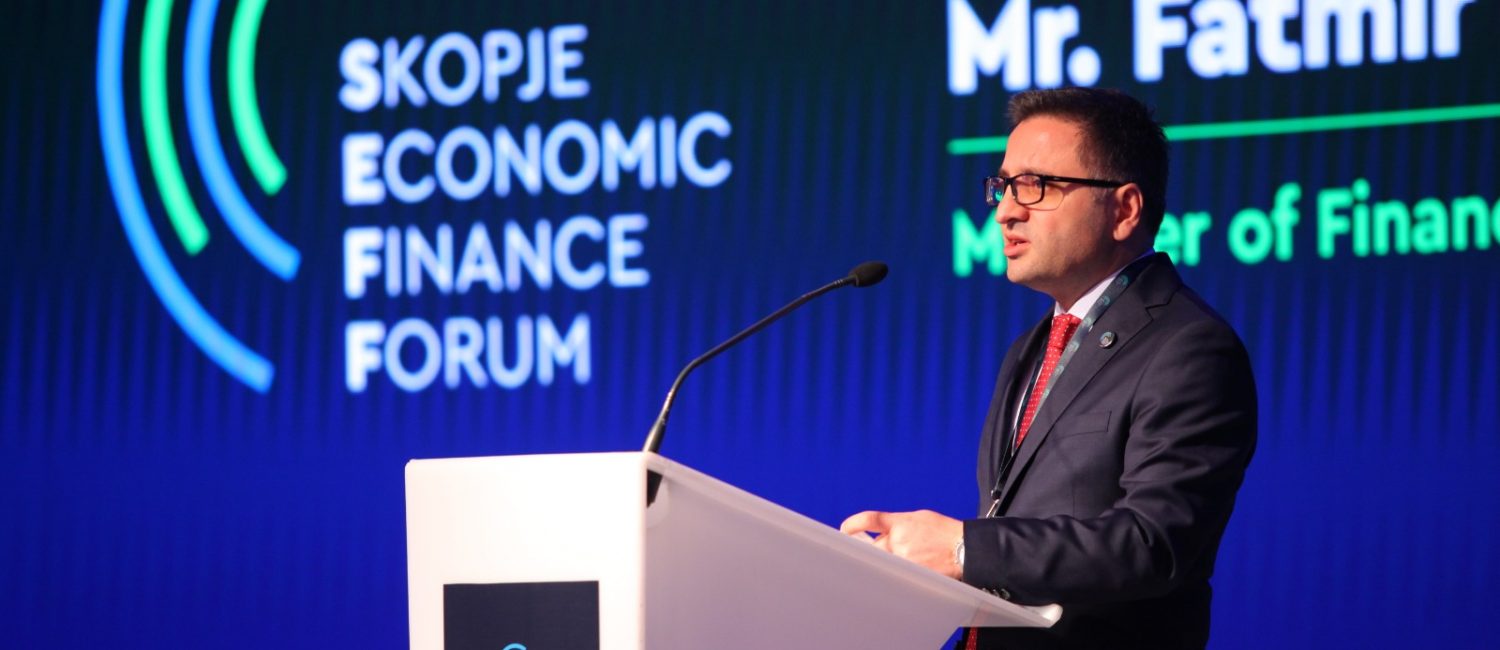Platform for open dialogue and inclusiveness
4th June 2022, Skopje – Skopje has been the center of economic discussions in the region this passing week. More than 400 international guests, as well as guests from the region and the country, were part of the Second Annual Conference held within the Skopje Economic Finance Forum – SEFF. If Nobel Prize winner Josef Stiglitz was in the focus of this year’s World Economic Forum in Davos, we have had the honour to host the esteemed professor and Nobel Memorial Prize Laureate in Economic Sciences, Paul Krugman, with his interesting overview of where is the economy heading, which I would elaborate on below. Apart from Nobel Prize winner Krugman, a constellation of eminent names in economy, finances and business sector in the region and globally attended SEFF. Without anyone being offended, and in the interest of the space allotment for writing this column, I would mention just few: President of the European Bank for Reconstruction and Development Renaud-Basso, Vice President of the World Bank Bjerde, Vice President of the European Investment Bank Pavlova, EU Commissioner Hahn, former Primer Minister of the United Kingdom Tony Blair, successful businessman Mike Zafirovski, world renown director Milcho Manchevski, ministers and esteemed university professors from the country and the region, directors of regional representative offices of almost all international organizations, distinguished businessmen and presidents of Chambers of Commerce from the region, representatives of NGOs, etc.

The event was also strongly supported by the country’s leadership, with the President of the country, the President of the Parliament and the President of the Government giving their speeches on the challenges and the prospects. I would like to extend a very warm gratitude to them all for contributing for the SEFF Conference to be worthy of globally recognized events with their discussions and presence. I also wish to express my most sincere gratitude to the partners for supporting our dialogue platform. My warmest thanks to my team for organizing the event, from the beginning to the end, who has shown dedication, professional precision and discipline.
To my great delight, SEFF has become a brand in a short time. My team and I will commit to continue building this brand, since it is of exceptional importance for the promotion and the positioning of our country. But, SEFF is much more than just a high-profile conference. It is an initiative of the Ministry of Finance to facilitate and encourage public policy debates in the country and Southeast Europe through annual conferences, seminars, analyses. The platform is aimed at involving all stakeholders in shaping the policies – politicians, institutions, expert and business community, NGOs and youth organizations. The result expected from this platform is achieving synergy when creating new policies and measures for economic recovery and inclusive, accelerated green growth.
SEFF is part of the SMART Finance concept (S-Strategical, M-Maintainable, A-Accountable, R-Reform-oriented, T-Transparent), which the Ministry of Finance applies. The concept pertains to setting up policies by virtue of a thorough, comprehensive and long-term strategy, adopted on the basis of facts and evidence, all to the end of yielding optimal results. The SMART concept also involves coping with the ongoing challenges, without thereby losing sight of the big picture – what we are striving for in the long term – accelerated and sustainable growth, to be attained with a clearly defined reform agenda.
The Big Picture: Growth in Times of Uncertainty?
We live in times full of complex economic challenges. Economic crisis has not been finished yet, when the second and third have started, shocks accumulate and uncertainty continues. Against such background, it is especially important not only for the economists and the policy makers, but also for the public as a whole, the citizens, to recognize and understand the whole connotation of it. It is when we all together clearly see the common goal and the path to achieving that goal, that we will achieve it much faster.
How to see the forest for the trees? Although I have started this column by writing about SEFF, I still dedicate it to the solution “how to sustain growth in times of uncertainty and beyond”? SEFF is the form (although Englishmen have a better wording – a vessel), which includes the possible answers to this question. Four pillars were launched for the SEFF Conference to set the discussions about the current and future policies, what to do in times of crisis and beyond. Pillar 1 pertained to “Macroeconomic Challenges in Turbulent Times”, Pillar 2 referred to “Resilience, Competitiveness and Regional Cooperation”, Panel 3 covered “Energy, Green Transition and Infrastructure” and Pillar 4 related to “Beyond the Crisis: Drivers for Sustaining Growth”.
Macroeconomic Challenges in Turbulent Times: Targeted Measures and Maintaining Stability
Let’s start from the beginning. I have written and talked about this plenty of times, so I will try to be as brief as possible, but still giving the big picture to those reading for the first time. For many years now our economy has produced low rates of economic growth, around 2-3% on average. It is as clear as day that a strong reform agenda is required to both change this and accelerate the growth rates to 5% and more, making them sustainable so as to achieve the desired economic development and improved living standard of all citizens in the country.
However, the pandemic was declared and the worst global economic crisis, the deepest recession, happened since the WWII. Most of the economies worldwide, including our, launched strong fiscal response, supported by the accommodative monetary policy, which provided for the necessary additional liquidity. Global economy has recovered really fast, in just a year, with some of the larger economies returning to the pre-crisis level, some even exceeding it. Our economy has recovered as well. Still, the world has faced new challenges. Injected liquidity with the fiscal sets of measures of the Government, solid demand recovery amid insufficient supply, accompanied by shifting of consumers’ preferences from services to goods, disruptions of the supply chains, have led to price pressures which commenced with the prices of energy products and food products on the global stock market, spilling over into the national economies and other products. War in Ukraine has put additional pressure, especially on some of the commodities, considering the importance of Russia and Ukraine in the global trade.
Like the other governments in the region and worldwide, we have been proactive since the onset of the pandemic and adopted anti-crisis measures. Six set of anti-crisis measures implemented during the pandemic total around EUR 1.2 billion, with additional EUR 615 million being allocated for the measures adopted since the beginning of the energy and price crisis.
I would also like to point out that the effective and prompt fiscal response has caused for the public debt to increase at most of the economies across the world. Following the pandemic, public debt in the countries in the region increased by around 10 to 15 p.p. on average. Public debt in our country rose by around 11 percentage points as well in the year the pandemic was declared, being slightly decreased now and by 7 p.p. higher in relation to the pre-pandemic level.
Such circumstances pose the question – how much fiscal policy can respond and how it should respond further on so as to protect the citizens and the economy, thereby not creating macroeconomic instability by inciting inflationary spiral and rapid debt increase.
The answer is – yes, there should be measures put in place, what kind of measures – targeted, tailored, so as for the vulnerable categories to be able to overcome the crisis, and they should be timely as well in order not to permanently disrupt the market principles. Everything else is fanning the flames, since injecting additional liquidity amid insufficient supply, which, on the other hand, is conditioned by import inputs, will only put additional pressure on price increase. This is the very model we will apply later, and it is recommended by both the European Commission and the international financial institutions, such as the World Bank and the IMF.
Professor Krugman has nicely elaborated on this issue in his address. The situation now differs from the one in 1979 (for information purposes – at the beginning of the 80s, expectations for high inflation were much more longer-term, as a result of which the workers demanded higher wages, while the employers, due to the expected inflation, were ready to pay them, resulting in inflationary spiral, which eased years later with a strong contraction of the economy). Inflation expectations now are shorter–term – stabilization is expected next year already. Professor Krugman pointed out that we will again have 2019 in 2024, and the deflationary tendencies will than become prevalent again. The only question is how to get there. One option is slight slowdown of the economy, with the other being a sharp decline. All this depends on how we will manage inflation thereon. Are we going to enter an inflationary vortex or avoid it wisely. Our challenge in times of uncertainty is to sustain growth.
Anyway, a significant period is ahead of us during which creating the public opinion will be equally important, if not much more important that the specific economic measures that will be undertaken. This is so because inflation depends on three factors – supply, demand and inflation expectations, with the third factor having a strong impact on the first two.
Hence, the first set of measures was aimed at cushioning the initial severe blows of the crisis, such as hindering the price shock and the speculative price increase, thus halting the inflationary pressures so as to prevent higher inflation rates. Tax relief was accompanied by the measures aimed at freezing the prices and setting the margin cap on some commodities. So-far implemented measures, geared towards combatting the price and energy crises, amount to around EUR 615 million, being one of the highest fiscal stimuli allocated in the region. To the end of focusing the measures on the vulnerable categories, as well as the gradual fiscal consolidation, the new anti-crisis measures will be targeted. Taking care of the citizens and the economy will continue, while remaining committed to conducting a prudent fiscal policy, thus reducing the budget deficit in the medium term. Under the Supplementary Budget, around EUR 76 million has been projected for anti–crisis measures, as well as subsidies for minimum wage increase, significant additional funds for agricultural subsidies – to end of increasing the yields, as well as funds for increasing both the pensions and the transfers for guaranteed minimum income, increasing the wages in most of the public sector, education, health, judiciary, prosecution, police and army.
Resilience, Competitiveness and Regional Cooperation
One of the factors Krugman mentioned as regards the path of the global economy is globalization. Today’s economy has revealed all “flaws” of globalization, most noticeable through the supply chains. A stronger quake, such as the pandemic was, completely disrupts the global chains, and present crises have occurred mostly for that very reason.
As the Professor himself pointed out, this does not mean that transnational companies will give up the benefits globalization offers, such as lower labour costs and costs of raw materials – inputs. It means that the equation will include additional variables now (they have actually always been part of the equation, but now they assume greater importance), such as for instance distance, higher transport costs, stability in the region. This is the new globalization or the closer ties and connections of the regions (shortening the supply chains), so we can plainly call it “regionalization”. Improving the infrastructure is the key factor, in addition to human capital and production input costs, in terms of attracting investments and integrating on the global economy, thus ensuring sustainable growth.
I will turn to two things – two possibilities open up for us. First, the potential new investors. Second, the closer ties and connections with the countries in the region and acting as one market. Benefits for the region can be huge. As the President of the American-Hellenic Chamber of Commerce said – a large investment in the region is a benefit for the whole region.
Hence, what can be done is connecting – partnerships and physical connection through corridors and infrastructure construction. Benefits can be gained on the single market with the policies for free movement of workers, capital, goods and services.
Energy, Green Transition and Infrastructure
As I elaborate each of the SEFF discussion pillars, I switch from short-term policies to longer-term policies, although addressing all these issues should start right now, immediately and urgently. In fact, the energy crisis has clearly showed us all that the more we depend on ourselves and diversify the sources of energy supply, the more resilient our economy will be. Investing in renewable energy sources and green transition are the way to reduce the energy dependence.
As pointed out at SEFF, EBRD and EIB provide substantial support for green transition. It is a matter of billions of euros these two international financial institutions would inject in the region to the end of supporting the energy sustainability.
Second aspect we should keep in view is the energy efficiency. The crisis has proven that we should wisely manage the goods, especially in times when their prices increases, such as is the case with the energy products. For instance, if we all are more economical, than we will all together pay lower electricity price. Hence, the new model of electricity tariffs follows – sustainable model as a response to the crisis.
Beyond the Crisis: Drivers for Sustaining Growth
The darkest hour is just before the dawn. Hence, after overcoming this crisis, the economy should be stronger and more resilient, a concept the author of “The Black Swan”, Nassim Taleb, calls antifragile. For growth rates to accelerate, structural reforms are required to provide therefore. Green economy, investments in human capital and digitalization were singled out as what is needed to work on intensively so as for the acceleration to be achieved.
When talking about human capital, special attention is to be paid to education, in addition to social security and health. Major reforms are needed – from pre-school age to higher education. We have to ensure that our children will use their capacity to a great extend in future and will not have their education completed but having gained incomplete knowledge. There has to be a merit system, a system for performance appraisal, encouraging the education staff to turn to an innovative process for transferring knowledge and creating new possibilities for the students.
Digitalization can also accelerate the process in both the public and the private sectors. We should run towards technology, adhere to the latest trends and innovations, rather that run away from it. Experience shows that countries with higher level of digitalization produce better economic results.
At the end, although it is not a structural change, I would mention leadership. This was a new topic at SEFF. Transparent, accountable governance, distribution of power, participation and inclusiveness in decision making, i.e. all elements of good governance, are equally important so as to trust those leading the country and the decisions they make. Leadership – not just as a formal governance, but rather as a broader term, build values for a sound society through personal experience and positive examples and create new perspectives for the future generations.
Reflections from the Conference and Perspectives
I was my pleasure and honor to give an overview of the two-day SEFF discussion together with the former Ministers of Finance. Although representing different political options, what we all agree about as for the aim of the fiscal policy are the fiscal consolidation and the structural reforms. Since only stable economy can produce sustainable growth, and because structural reforms are required to attain higher growth rates.
SEFF platform continues to add fresh contents, discussions and answers to new questions. The focus will be aimed at the youth, the youth initiatives, networking, building partnerships, since the future lies with the youth.
Fatmir Besimi, Minister of Finance
















